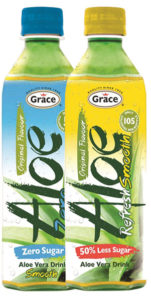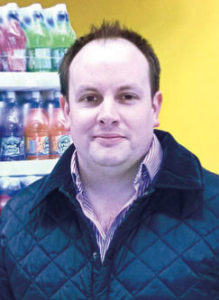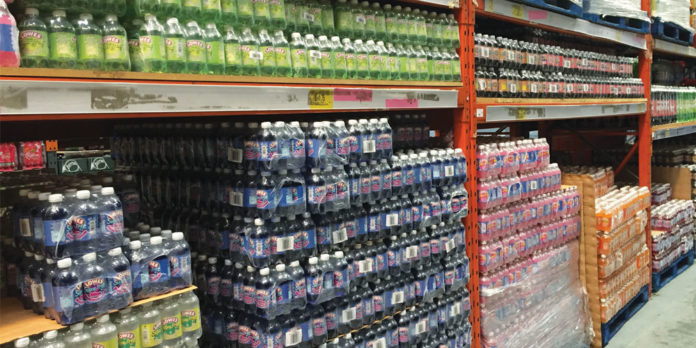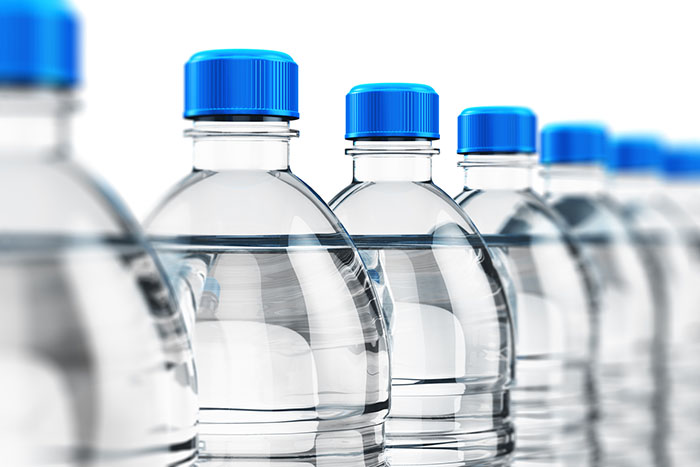Toby Hill looks at the various ways wholesalers can make a profit in the soft drinks category, despite the looming threat of the government’s industry levy.
Soft drinks have long been a bedrock of reliability for traders at all points in the supply chain. But now, with the category in the government’s firing line, it seems that turbulent times might lie ahead.
One wholesaler told BW that his business is cutting its soft drinks range by 20% to concentrate only on those products that sell consistently well. Suppliers, too, are conscious of oncoming difficulties. “The government’s childhood obesity plan, published in 2016, has kept the issue of sugar and diet squarely in the forefront of the media and in the consumer’s mind,” notes Carol Saunders, head of customer marketing at Highland Spring.
At the heart of this strategy lies the sugar tax, which is set to detonate in April 2018. The government remains intent on adopting the tax, despite research, published by the Oxford Economics thinktank, suggesting it would reduce sales of soft drinks by just 1.6% while leading to 4,000 job losses and a £132m drop in the industry’s economic contribution.
The country’s wider economic prospects are fragile, too. With Brexit and other factors stirring uncertainty, Nielsen shopper research manager Sophie Jones predicts “inflation and price rises will shape more conservative shopping habits through 2017.”
With such unpredictable trading conditions close at hand, wholesalers are looking for the telling trends that indicate the category’s future direction. Consumers will still be seeking refreshment, but what will they be wanting to drink? Here we look at some of the key developments that will guide sales of soft drinks over the coming months.
Making it grown-up
Meeting adult soft drinks tastes can be a challenge, as anyone in the on-trade will tell you. Coca-Cola European Partners (CCEP) is working hard to solve this puzzle, marketing lines like Appletiser as “a sophisticated alternative to alcohol that people are happy to consume while others may be drinking beer, wine or cocktails,” according to Amy Burgess, trade communications manager at CCEP. Such a strategy is buoyed by ONS statistics showing that 21% of adults now choose not to drink alcohol at all.
Alternatively, some grown-ups merrily tipping back the booze are looking for soft drinks to partner it with. “Mixers is a fast-growing sector, having enjoyed 10.4% growth over the past year,” Burgess says. CCEP’s Schweppes brand is driving growth in the sector, offering a wide selection of variants, encompassing Tonic Water, Canada Dry Ginger Ale, Bitter Lemon, and more. “With consumers being increasingly health conscious, the brand also offers a wide selection of Slimline variants, ideal for those looking to reduce their sugar intake,” Burgess adds.
Whatever happens, humans will always be celebrating the big events, the births, deaths and partnerships, that mark the rhythms of their lives. And the same health concerns that are driving people away from high-sugar carbonated drinks in their everyday lives are also pushing people towards innovative soft drinks in other contexts. “More people are choosing to moderate how much alcohol they consume and are looking for soft drink alternatives, but do not want to be restricted to only sugary pop or fruit juices,” says Dan Harwood, head of wine education at Eisberg alcohol-free wine. “Alcohol-free wine provides a more premium, grown up and low calorie choice for non-drinkers whilst allowing people to feel part of the occasion.”
Proving the point are statistics from market research firm Nielsen, which show that sales of alcohol-free wine increased by 39% from 2015 to 2016. The Eisberg cellar contains a range of options for the abstinent, who still wish to celebrate with something special, from alcohol-free cabernet sauvignon and chardonnay, to sparkling whites and roses.
Britvic’s commercial director for convenience and impulse, Trystan Farnworth, recommends that wholesalers capitalise on this trend by adopting a structured three-tiered model, that enables them to offer choice, whilst managing SKU count constraints.
Farnworth says: “A ‘mainstream premium’ offer should include established big brands such as J20 and Britvic tonics, but also be sure to back new innovation which is well supported by above the line marketing including launches, such as J20 Spritz, and our new heritage-flavoured range of R Whites lemonades. A premium offer should include a range of professional syrups for flavouring mocktails, such as Teisseire, as well as products which can serve a dual role; as an energy product, which can be enjoyed in an on-the-go environment, as well as in a mixing setting. Purdey’s is a great example of this. Finally, and only where the wholesaler’s base allows, consider stocking a super-premium offer. Britvic recently backed an incubator company, Wisehead Productions, dedicated to serving this segment.”
Water your range
While the soft drinks category as a whole races to adapt to healthier consumption habits, one product remains above such concerns. Sales of bottled water have grown steadily throughout the new millennium, with average UK consumption jumping from 26.9 litres a year in 2001, to more than 44l in 2015.
“The total soft drinks market is in decline, while plain bottled water is showing significant growth as consumers switch into the category from sugary soft drinks,” says Carol Saunders, head of customer marketing at Highland Spring, the UK’s leading producer of naturally-sourced bottled water.
Glacéau smartwater has been another major beneficiary of this trend, growing its sales by more than 80% in 2016. Owner CCEP is capitalising on its popularity by launching glacéau smartwater sparkling into the sparkling water market, which grew 8.6% in 2016.
And it isn’t just plain and sparkling water that are selling well: flavourful alternatives are also proving popular with customers. Coconut water sales recently topped £100m in the UK. Meanwhile, at the 2016 Virgin Media Business awards, the water firm What A Melon picked up a £50,000 award for their marketing of their watermelon water.
Adventurous flavours
UK shoppers are becoming more diverse, more discerning, and better-travelled. Adrian Troy, marketing director at AG Barr, describes growth in shopper diversity as one of four key trends that wholesalers need to be aware of. Research by travel association ABTA found that almost one in five people (18%) planned to travel to a country they had never been to before in 2016, compared to just 9% the year before.
At the same time, consumers are looking for something a little different when choosing their refreshment; no longer content to grab the same sugar-filled flavours from the convenience store shelf. One way that wholesalers can tap into these trends is by stocking more adventurous, global flavours.
One supplier that has rode this wave over the last few years is Grace Foods, a leading supplier of Caribbean food and drink. “A growing number of consumers are expanding their taste horizons and seeking new and exotic flavours,” says Nyree Chambers, head of marketing at the firm.
Grace Ginger Beer brings the Jamaican classic to British shelves, while Bigga Soda, one of Jamaica’s most popular brands, is available in four flavours: fruit punch, grape, pineapple, and grapefruit. Grace also offer aloe vera drinks including low- and no-sugar varieties, alongside its mighty malt energy drink.
But despite Grace Foods’ inroads into the market, the leading drink in the exotic juice category is still Rubicon. Owner AG Barr has tuned into consumer trends towards healthier products with its Rubicon Spring brand, a range of four products combining sparkling spring water with fruit juice, containing 15 calories or less per bottle. “Positioning plays a key role,” Troy explains. “Shoppers who are looking for a healthy option tend to look at the water fixture in the chiller, so AG Barr recommends that Rubicon Spring is stocked in the chiller cabinet, positioned between carbonates and water.”
Tailor your tastes
While one way to match more discerning consumer tastes is to bring the world into your depot, another is to do the opposite – and focus on local tastes.
With preferences in a state of flux as clean-living trends and prospective price hikes hit buying habits, consumers across the country will react differently depending on their pre-existing circumstances. Barr’s Troy suggests working with local sales data and face-to-face conversations with customers, rather than national statistics, to gauge the best approach.
“The growth in popularity of low-calorie soft drinks means that it is more important than ever for retailers to talk to their customers and find out what they are looking for, to enable them to tailor their offering,” he explains.
Working with this fragmented market could also involve drawing on local entrepreneurs to stockpile local products; whether that is Canny Milkshakes from Newcastle-upon-Tyne, or Dalston Cola from East London. Or it can simply mean studying your sales of traditional bestsellers and NPD in order to align your range in line with your region’s evolving buying habits.
But as Britvic’s Farnworth cautions: “Offering the right choice is key to winning in wholesale. However, excessive SKU proliferation drives waste, cost and complexity into any supply chain. My biggest piece of advice to any wholesaler would be to not bury your head in the sand. Don’t be the trade equivalent of a ‘hoarder’ you see on those TV shows. Work with your leading suppliers on annual range reviews and diarise these reviews and allocate proper resource to seeing them through. We have recently done some work with Bestway, as an example, which led to a SKU count reduction in their soft drinks category of 20%. By working collaboratively, the range review reduced operational cost, led to superior availability and grew sales. This means that everyone wins: the supplier, the wholesaler and the customer.”
Energise yourself, sugar-free
Increasingly, consumers expect to see sugar-free options available across all product types within the soft drinks category. And, despite traditional associations between sugar and energy, this is no less true in the case of energy drinks: sales of low-calorie energy drinks grew by 32% in 2016, making it the highest performing segment in the energy drinks sector.
“We have seen sugar-free sales growing at a phenomenal rate,” says Simon Gray, managing director at Boost. “As such, wholesalers should stock a good range of sugar-free alternatives.”
Accordingly, Boost and other companies have been working hard, promoting sugar-free products to meet this demand. Boost Sugar Free 250ml increased its sales by 12.5% in 2015, while sales of the 1l bottle grew by 40%, according to IRI data. The firm also offers a sugar-free pink lemonade flavour in 250ml cans.
Hitting shelves this month, meanwhile, is a continuation of Lucozade Ribena Suntory’s Lucozade Zero range. The new Zero Original flavour will be available in a range of sizes.
Elsewhere, CCEP’s entrant into this fizzing marketplace, Monster Energy Ultra, was recently bolstered by the addition of a fourth flavour, Monster Energy Ultra Citron, which joins pre-existing variants Ultra White, Ultra Red and Ultra Sunrise.
Trystan Farnworth, commercial director for convenience and impulse at Britvic
BetterWholesaling: How are you helping wholesalers prepare their soft drinks ranges for the incoming ‘sugar tax’?

Trystan Farnworth: Helping wholesalers to help their customers, and ultimately consumers make healthier choices, is in our DNA. Britvic started out in the 1930s as the British Vitamin Products Company, using soft drinks to bring an affordable source of vitamins to the people of Britain. Fast forward to 2016, and as the UK’s leading branded supplier of no- and low-sugar drinks with an unrivalled portfolio breadth, we are excited about working with wholesalers, regardless of whether they specialise in the foodservice, licensed or retail sectors.
In the last few years, we have taken very bold steps to help consumers make healthier choices – to a degree whereby now, 67% of our value sales are represented by no- or low-sugar drinks, versus standard ones. Much of how we can help rests on our long-standing commitment to sugar reduction. We have reformulated so much since 2012 that we have already removed 19bn calories annually. We have also been leading the way with the introduction of natural sweeteners in the UK. In 2012, we were the first UK soft drinks company to use stevia, in our V Water brand.
As we are now just over a year from the soft drinks industry levy applying, we are about to begin a programme of activity of education and inspiration with the wholesale trade in terms of what this means for them. I firmly believe that wholesalers who get ahead of the game on the levy and work proactively with us to communicate to their customers will be well placed to turn what could be perceived as a threat into an opportunity.
BW: What work are you doing in the adult soft drinks area and how can wholesalers get on top of this trend?
TF: The adult soft drinks and mixers sub-categories are two of the fastest-growing and most dynamic parts of the market. We are seeing this not just within the licensed and foodservice sector, but also within the grocery and impulse store environments, too. So, it should be on the radar of all wholesalers.
Britvic has been leaders in the adult soft drinks arena for decades, with its iconic Britvic Mixers and Juices range, and brands such as J20, which remains the leading adult soft drink by a big margin. We have invested heavily in this area, and we have just relaunched our Britvic Mixers and Juice range, which carries an iconic new bottle look, as well as a popular 200ml format. In addition, to capitalise on the ‘with food’ occasion, we launched J20 Spritz – a lightly sparkling version of J20. We have been reformulating, too – all J20 variants are now less than 100 calories per bottle, and J20 Spritz is only 55 calories per bottle. We have also invested in a multi-million pound above the line campaign, including TV, for these brands, to drive trade and consumer awareness. Furthermore, we have also just made J20 and J20 Spritz available in a 12-pack format exclusively for top up cash-and-carry wholesalers, and we have seen strong sales on the back of this.










Thanks for sharing. Informative post on
Soft drinks suppliers.